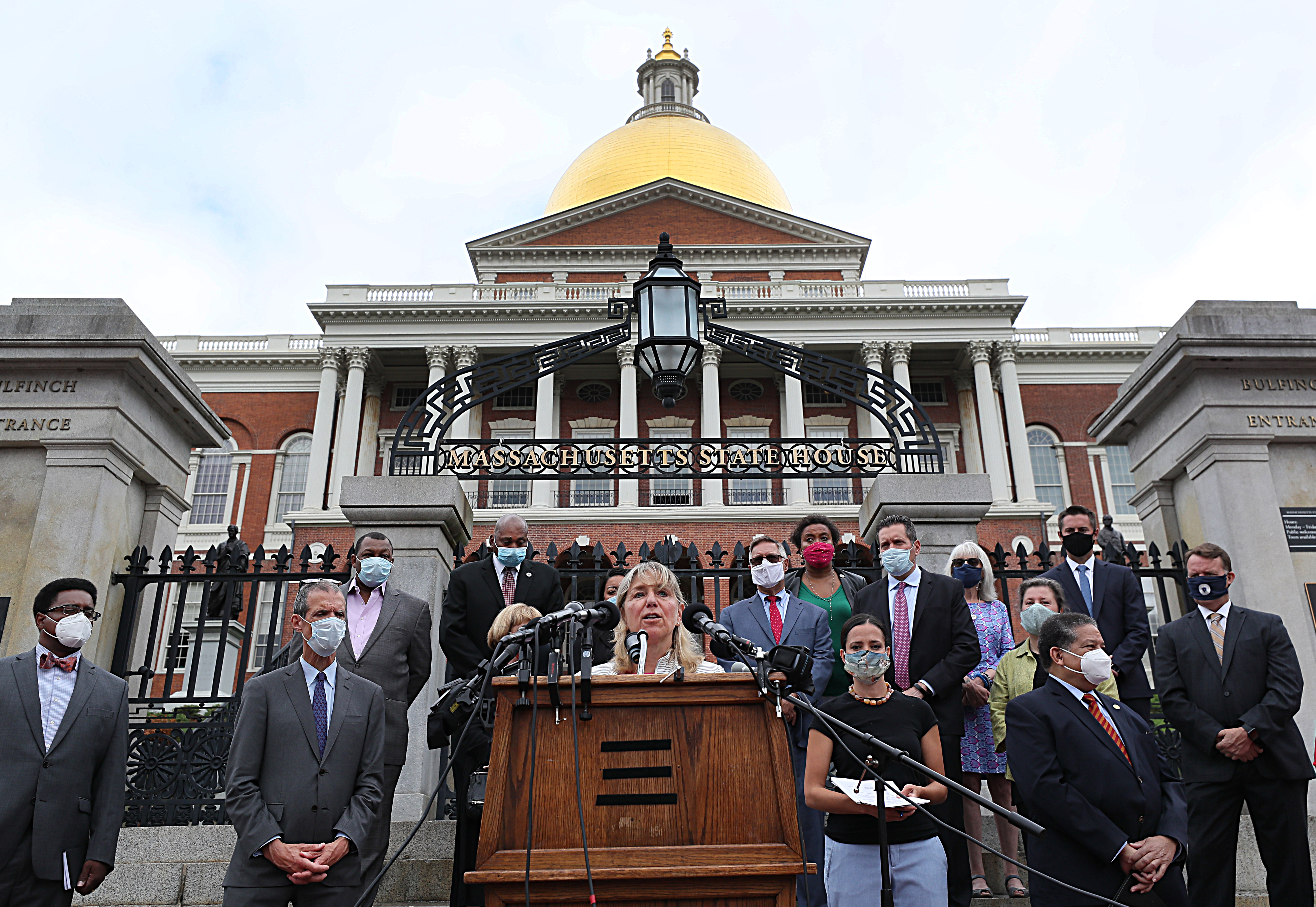House Speaker Robert DeLeo and top Democrats plan to seek a vote Wednesday on police reform legislation that makes good on the promise leaders made to Black and Latino lawmakers following the death of George Floyd, proposing a new system to license cops and enforce limits on the use of force, like chokeholds and tear gas.
The bill, which was voted on Sunday night in committee, would also curb the use of qualified immunity, a controversial legal principle that can shield police officers from civil lawsuits in cases of misconduct.
Get top local stories in Boston delivered to you every morning. Sign up for NBC Boston's News Headlines newsletter.
The issue of qualified immunity has become a flash point in the fast-moving debate on Beacon Hill over policing, and while House leaders will seek to limit its use in state law, they have proposed a different approach than the Senate.
The House officially introduced the bill a week after the Senate passed its version of policing reform and just days after House leaders solicited and received thousands of emails offering testimony and feedback on the Senate's legislation.
The House Ways and Means Committee opened a poll of its members just before 9:30 p.m. on Sunday night, and gave them until 10 a.m. Monday to weigh in on whether to recommend the 123-page bill to the full House. With just two weeks left of formal sessions for the year, time is running out on legislators to finalize what has become a top end-of-session priority for both the Legislature and Gov. Charlie Baker.
The bill's release and the anticipated debate later in the week also come after a weekend during which the country mourned the loss of civil rights icon John Lewis, the Congressman from Georgia who died at 80 after a battle with cancer.
Since the May killing of Floyd in Minneapolis while in police custody, political leaders have been under pressure from demonstrators and others to address systemic racism in both law enforcement, and all aspects of society. The bill would create a new permanent Commission on the Status of African Americans to help policy makers develop solutions to discrimination and other issues facing the Black community.
The commission, as conceived in the bill, would be a resource for policy makers and a "clearinghouse" of research and information on issues impacting the Black community in Massachusetts.
In addition to making policy recommendations to the Legislature and executive branch to ensure equal access to government services for Black residents and to address discrimination, the commission would also recommend candidates of color for positions throughout state government, including for appointments to board and commissions.
"Those voices demanded we as a Legislature change how we think about public safety and that we address the causes of systemic racism. With this legislation, we will begin the task of making our public safety more equitable for the entire Commonwealth," said Ways and Means Chairman Aaron Michlewitz in a statement Sunday night.
More Police Reform Coverage
Licensing and Qualified Immunity
The bill also touches on the five main areas prioritized by the Black and Latin Legislative Caucus following the death of Floyd, including the creation of a new independent Massachusetts Police Standards and Training Commission.
The commission would be responsible for licensing all law enforcement in the state every three years, with the power to revoke, or decertify, a police officer for misconduct, including the use of excessive force, bias, conviction of a felony, witness intimidation or submission of false time sheets.
"The Caucus demanded police accountability and transparency, and this bill addresses each of our initial core demands," said Rep. Carlos Gonzalez, a Springfield Democrat and the chair of the Massachusetts Black and Latino Legislative Caucus.
"This will change law enforcement institutions and begin to answer the call of civil rights leaders, such as Martin Luther King and Rep. John Lewis, who dedicated their lives to addressing racial equity. In addition, it starts addressing change in honor of George Floyd whose tragic death sparked a national conversation through protest and now by Legislative action," Gonzalez said.
The seven-member commission would include appointees from the governor and attorney general, with each getting two selections. The remaining three appointments would be made jointly, but must include the chair of the Massachusetts Law Enforcement Policy Group and at least one other member selected from a list of three choices submitted by the Massachusetts Coalition of Police, the state's largest police union.
The bill stipulates that the racial and gender makeup of the commission should reflect the state's population.
The structure of the commission differs from the one proposed by the Senate, which would be a 14-member commission set up within the Executive Office of Public Safety and appointed by the governor, and would have to be reconciled if the House passes this bill unchanged.
The two branches also diverged in their approach to qualified immunity.
The police unions are strongly opposed to changing the doctrine, which they say protects officers and their families from frivolous lawsuits. However, reform advocates, including U.S. Sen. Elizabeth Warren and U.S. Rep. Ayanna Pressley, have strongly called for curtailing or eliminating its use, which critics say has become a barrier to holding police accountable.
The Senate bill would limit the use of qualified immunity by allowing civil lawsuits to proceed if a police officer should have reasonably known their behavior violated the law, instead of requiring clear proof that a law had been broken.
In the Ways and Means bill, House leaders are proposing to tie qualified immunity for police directly to the licensing process and revoke immunity in any case that results in the decertification of a police officer.
By linking immunity and decertification, the House may also be trying to address the concerns raised by some senators during debate that the changes they were making to qualified immunity applied not just to police but all public officials, from local conservation officials to boards of public health.
The bill would also ban the use of facial recognition software or any other form of biometric surveillance by a government official or agency unless specifically authorized by law.
However, it would give the Registry of Motor Vehicles permission to use such technology in order to verify someone's identity to issue a license or permit, and to perform a search at the request of law enforcement with a warrant.
Chokeholds would be banned, under the bill, and police would be restricted from firing a weapon at a fleeing vehicle and from using tear gas, rubber pellets or dogs to control behavior unless there were no other options to protect public safety and other deescalation tactics had been tried and failed.
The execution of no-knock warrants would also be limited, and the legislation would establish a right of citizens to "bias-free policing" and create a duty to intervene for officers who witness misconduct by other law enforcement.
"We owe a duty to the public and to the members of law enforcement to ensure that training is consistent and is available in all areas of the state," said Rep. Claire Cronin, the House chair of the Judiciary Committee.
Like the Senate, House leaders are also proposing to put restrictions on the type of information school officials can share with law enforcement, including immigration status, religion, ethnicity, neighborhood of residence or suspected gang affiliations, unless it's related to a specific incident.
The restrictions generated debate in the Senate from lawmakers who worried it would give safe harbor to gang members in schools, but supporters said students need to be able to attend school without fear of being judged.
The bill also establishes new training and certification requirements for school resource officers, and establishes a new commission to develop a memorandum of understanding about the role of school resource officers and how they will interact with students.
Finally, the bill incorporates some changes to the governance of the State Police sought by Gov. Baker earlier in the year that would, among other changes, allow a governor to hire the colonel of the State Police from outside the department.



